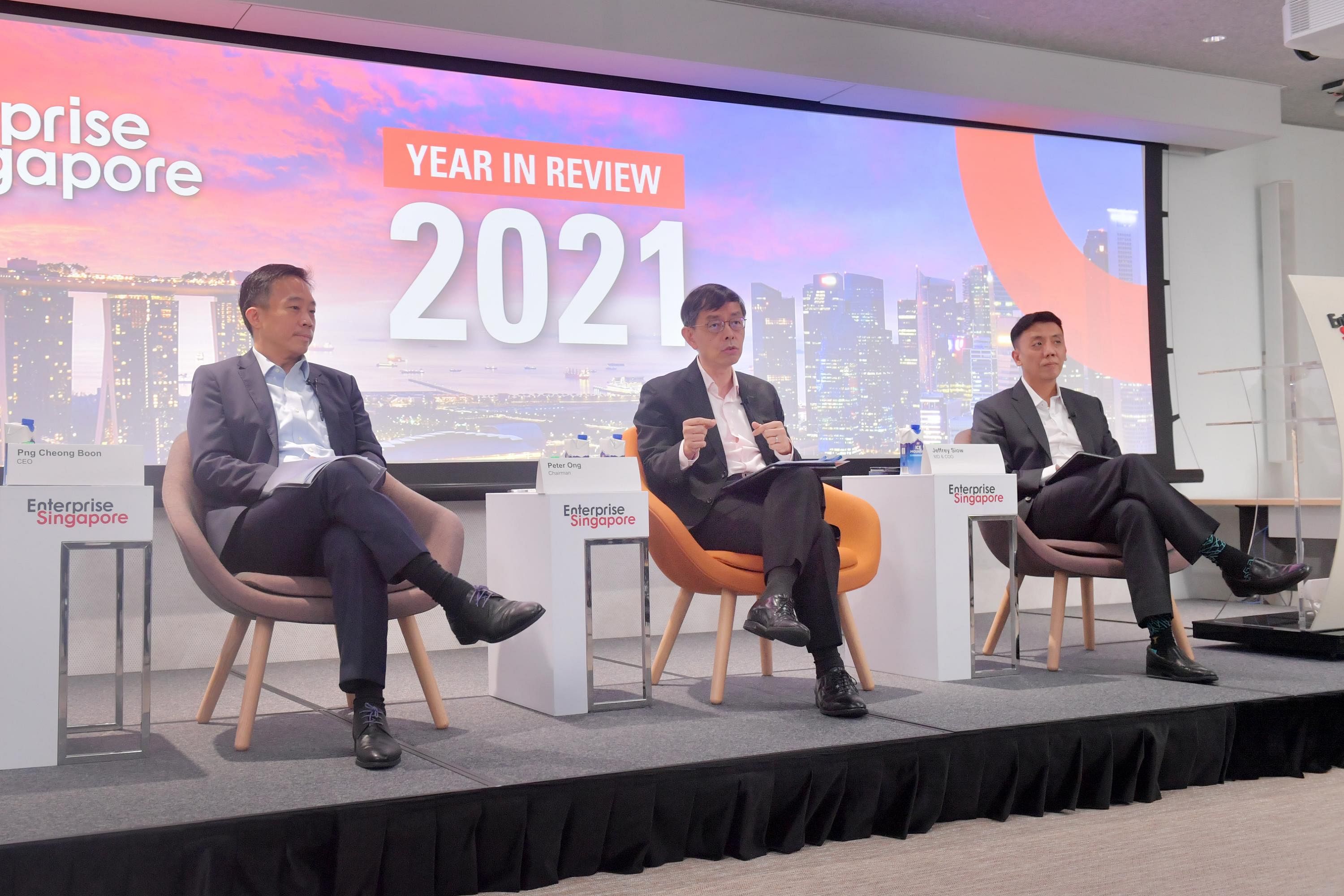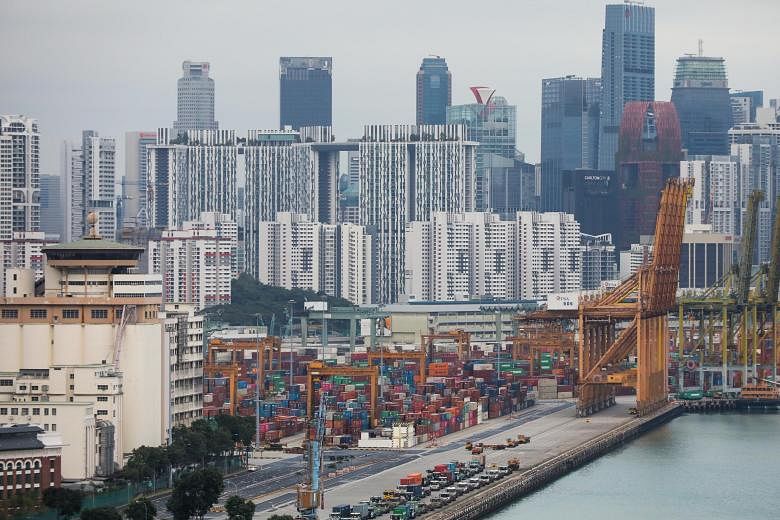SINGAPORE - The economic recovery looks to be well entrenched with new data showing that firms are increasing moves to reconfigure their business models for the post-pandemic environment while requests for government assistance have fallen.
Enterprise Singapore (ESG) noted on Friday (Feb 11) that the number of companies drawing government support for growth and transformation efforts rose 44 per cent to 22,100 last year.
The more robust economy is also reflected by a sharp 40 per cent decline in the number of firms seeking public financing to 12,600 over 2020.
The challenges of business continuity and cash flow also seem to have eased last year, with companies drawing loans of $8.6 billion, a 52 per cent drop from 2020.
The ESG's 2021 report card was in part a snapshot of the sweeping changes taking place among some of Singapore's 280,000 micro, small and medium-sized enterprises (SMEs), which form 99 per cent of the base the agency serves.
Trade and Industry minister Gan Kim Yong struck a cautiously optimistic note at thebriefing: "We are facing cost pressures from higher energy and commodity prices, as well as supply chain bottlenecks. Geopolitical tensions have caused major uncertainties and potentially, further technological bifurcation."
Omicron added another layer of uncertainty, but with Singapore's high and rising vaccination rates, falling Covid-related deaths and signs of a strong global economic recovery, "we have reasons to be confident", he added.
Instead of just riding out the pandemic last year, 1,600 local enterprises tapped ESG support in overseas markets, spurred both by new-found capabilities in digital and the push to find new supply sources.
A Singapore Business Federation (SBF) survey in the second half of last year found that sentiment had improved with the number of firms saying that the pandemic had hurt operations falling from 63 per cent in 2020 to 34 per cent.
SBF chief executive Lam Yi Young said companies are also more confident about overseas expansion: "One in three businesses indicate that they are confident in pursuing overseas expansion in the next six to 12 months.
"The top countries that businesses are engaged in overseas activities are Malaysia, China and Indonesia."
SBF joined forces with Enterprise Singapore to launch the GlobalConnect@SBF programme in Nov 2019, which facilitated 80 projects in two years.
ESG chairman Peter Ong said he was "inspired" by the gumption showed by local firms: "Compared to 2020, ESG facilitated overseas projects for more enterprises in 2021. While this was still below the number of projects secured pre-Covid, it is still encouraging to see many pressing on."

China, Vietnam, Malaysia, the United States and Indonesia were top markets on local entrepreneurs' list. This year, said Mr Ong, ESG will ramp up its efforts to get more global pickings for local firms.
It will lead companies into secondary markets such as Danang in Vietnam and Surabaya in Indonesia, as well as to untapped territories such as Latin America and Africa.
He also noted that the agency would intensify innovation and start-up growth, nurture sustainability and emerging tech companies and groom promising local companies with global ambitions.
"Internationalisation will need to be supported by innovation efforts," said Mr Ong. "Ultimately, we want these efforts to turn local champions into globally competitive enterprises who will take their place on the global stage."
The priorities reflect a starkly different growth mentality compared to a crisis-fighting 2020, when the agency had to ramp up a contact centre overnight to take frantic queries from firms, help secure essential supply lines for Singapore and create and enforce safe-distancing measures for businesses ranging from restaurants, shops to beauty and wellness centres. The Singapore economy shrank 5 per cent that year.
With 7 per cent GDP growth last year and 3 to 5 per cent projected this year, ESG will no longer focus on just helping businesses ease cash flow and stay afloat amid Covid disruptions.
ESG chief executive Png Cheong Boon pointed to the agency's work in seven key areas last year: strengthening businesses' productivity, capabilities, innovation and internationalisation; collaboration with trade associations; promoting start-ups; promoting collaboration between large and small companies; increasing global partnerships and market access; scaling up local enterprises; and continuing support measures for Covid-19 disruptions.
Local companies Growthwell Foods, Big Tiny and Containers Printers are among enterprises showcased as success outcomes.
The Delta variant slowed down the pace of internationalisation last year, said Mr Png, adding: "The Covid situation in many markets were quite unstable, that also limited the extent of work our colleagues overseas could undertake.
"In terms of the number of projects we facilitate, we maintained about the same level as 2020, but we thought we could have done better had the situation been more in our favour."
He noted that the agency made the most impact when companies and trade associations "came together, working collectively not only to look at new innovations, but new markets".
The pandemic brought together the government and business community closer than ever before, said Mr Ang Yuit, vice president for the Association of Small & Medium Enterprises (ASME).
Without ESG, companies would still have digitalised, said Mr Ang, "but it would have been more uneven. ESG created the effect of raising the water level for everybody, rising the tide."
The association hopes to see paperwork made easier for trade bodies to collaborate with ESG, as well as for SMEs to apply for grants. And of course, a later-rather-than- sooner hike in the goods and services tax from 7 per cent to 9 per cent.
Overall, the agency did a stellar job in 2021, said Mr Ang, adding: "Enterprise Singapore really busted itself to make things happen. I was in close contact with a lot of the senior enterprise officers, so we know how they responded and how they checked on things. They verified, they expedited.
"If you compare Singapore SMEs versus other countries' (in this pandemic), we would have moved forward a bit more than the rest, because of ESG."
Mr Gan, whose ministry oversees the agency, added: "Your efforts to secure essential healthcare and industrial supplies have helped to keep our supermarket shelves well-stocked.
"You also played a critical role in securing access to Covid-19 supplies such as ART kits, so that Singapore can remain open and maintain a semblance of normalcy through the ups and downs of the pandemic."



